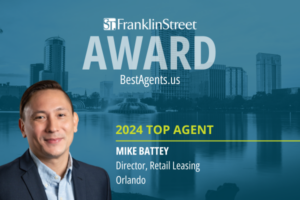VooDoo BBQ & Grill is the house that foreign capital built.
The owners of the chain’s Florida franchises say they’ve raised $40 million from investors in 12 countries through the EB-5 visa program, sprouting new locations in Miami, Pembroke Pines, Hollywood, Fort Lauderdale, Boca Raton and Pensacola.
Faced with a credit desert and stringent lending criteria as nearly 70 banks failed in Florida in the aftermath of the Great Recession, the New Orleans-style barbecue franchise had to look elsewhere.
The company found international lenders and cash-rich private equity firms to be the big-money lenders and backers of South Florida’s most lucrative commercial deals.
“We’re not where we were in ’04 or ’05 when anybody could get a loan, but the appetite from financial institutions is increasing,” said Israel Alfonso, a Miami partner in Akerman, whose annual real estate survey measures economic conditions and investor confidence.
For VooDoo, the new wave of investment followed a tedious and futile fundraising drive in the U.S.
Jafrejo Holdings LLC, the chain’s Florida franchisee, said its startup businesses faced multiple roadblocks from traditional lenders.
“We couldn’t meet underwriting requirements,” Jafrejo partner Joe Sloboda said. “We were starting new restaurant locations, but all the banks we talked to wanted to see existing operations, P&L reports and cash flows.”
Jafrejo took its business elsewhere, creating a subsidiary, Florida Restaurant Franchise Group, to court foreign investors for new VooDoo and Twin Peaks restaurants.
For about 18 months, the partners made several trips abroad, spending about $150,000 on travel. At first, they met attorneys, financial services providers, agents and immigration advisers with clients looking to invest in U.S. businesses. Then they created a network of licensed professionals in each country to work on their behalf.
“The big misconception is people think this is easy to get. It’s cheap money, but it’s not easy to get. It’s challenging, and you have to make sure you connect to people who qualify and can show the U.S. government that the money they’re investing came from legal sources,” Sloboda said. “The biggest part is making sure you’re working with people who fully understand the EB-5 rules and can package your deals in a way that will be approved by the U.S. government and still be accessible to investors. There’s a delicate balance.”
Nontraditional Sources
An EB-5 visa from U.S. Citizenship and Immigration Services offers foreign lenders a path to permanent U.S. residency through investments that create or save at least 10 full-time jobs and stimulate the U.S. economy. Candidates must be willing to invest $1 million or $500,000 if their ventures are in rural areas or areas with high unemployment.
Jafrejo’s deals are expected to create 1,600 jobs. Investors are passive participants in a limited partnership funding restaurant development at an undisclosed interest rate.
“It’s more favorable than traditional commercial financing,” Sloboda said. “And it’s more favorable by enough of a margin to make it worth our while to spend the time, money and energy to do this over a two-year period.”
At first, it took months for underwriting and a year to raise $5 million, but the lead time shrunk with each deal and growing network. In about five years, Florida Restaurant Franchise Group raised $40 million in Brazil, China, Russia, Britain, Mexico, Nigeria and other countries. They’ll use part of the capital to fund 10 Twin Peaks restaurants in Florida by 2015.
“In some ways it’s a good thing for local developers because competition makes the capital less expensive,” said Greg Matus, Franklin Street Real Estate Services’ regional managing partner for Broward and Palm Beach counties. “We’re very quickly back up to where we were, especially on the commercial side. Rents are up, cap rates are down, and the competition is as fierce as it’s ever been.”
Flush With Cash
The EB-5 program is the latest resource for South Florida real estate developers, who’ve long enjoyed a flood of international money that’s buoyed the sector and funded its rebound.
“With all the turmoil that’s taking place internationally, we’re seen as the cleanest shirt in the dirty laundry pile,” said Ed Easton, CEO of the Easton Group, a commercial real estate investment, brokerage, property management and development firm in Miami. “People want to put their money in the U.S. They look at South Florida as a safe place.”
Other financiers have started to notice.
In areas like Sunny Isles Beach and Miami Beach, which were once fueled largely by foreign money, a rising class of domestic power brokers is outspending their international counterparts by pumping in hundreds of millions of dollars.
U.S. private equity firms, the new giants of South Florida lending, are changing the dynamics for local developers and competing lenders.
“If you have money and were able to buy in 2008, 2009, it was hard to make a mistake,” said Brinkley Morgan partner Bill Kramer, a 30-year attorney who specializes in real estate. “Vulture funds and real estate investment trusts bought up the bad capital when the market crashed, and now these funds are flush with cash.”
And they’re not afraid to spend it.
Rising Private Equity
One high roller, New York-based Blackstone Group, created a fund in 2008 to respond to the dislocation of global real estate and credit markets.
Positioning itself as less conservative than traditional lenders, the Blackstone Real Estate Debt Strategies fund is among the latest big-money backers of some of the region’s largest projects. This year alone, it provided a $290 million construction loan for the Surf Club Four Seasons Private Residences and Hotel in Surfside and $120 million to fund the Biscayne Beach condominium in Miami’s Edgewater neighborhood.
Other funds, meanwhile, have been aggressive buyers, closing multimillion-dollar deals for their own portfolio.
Boston-based investment adviser TA Associates Realty LLC completed a $66.4 million transaction in August, paying about $122 per square foot for two Fort Lauderdale office towers at 200 E. Broward Blvd. and 203 SE First St.
That same month, Memphis-based Education Realty Trust Inc. paid $43.5 million for 109 Tower, a student housing complex in Sweetwater, while Phoenix-based Cole REIT Advisors III Inc. spent more than $7 million to acquire Red Lobster franchises across South Florida. The buying sprees continued with Denver-based DCT Industrial Trust Inc. scooping up industrial properties in Medley and Boca Raton for more than $10 million.
And in July, RLJ Lodging Trust acquired Miami Beach’s Hilton Cabana for $71.6 million in the second of two major hotel deals in the region. Days earlier, New York-based Carey Watermark Investors Inc., a hospitality real estate investment trust, paid a 79 percent premium on a nearly $58 million deal for a Boca Raton Marriott.
“Everything’s now shifting to U.S. private equity funds,” Kramer said. “Traditional institutional lenders are very hamstrung by regulations, but private equity and vulture funds are able to take risks. The whole reason for the overhaul of the banking regulations was to try to prevent the over-exuberance we had before. The problem with that is the pendulum has swung too far, and the banks are now too conservative. To get the deals done, you need private financing.”
Equity Partners
That’s what McCraney Property Co. has found.
Outside investors typically form strategic alliances with market insiders, and for McCraney it’s meant the ability to accelerate its projects.
To quickly multiply its holdings, the West Palm Beach-based industrial developer formed a joint venture with New York-based Clarion Partners LLC.
When it teams with a lender, McCraney typically purchases land for cash, then forms a 50-50 partnership to fund construction and development. Its arrangement with Clarion will create about $60 million in new projects throughout Florida, including a 150,000-square-foot Dade Paper Co. distribution center and a 250,000-square-foot project in Orlando.
“What we’re seeing is by virtue of the lack of product built during the downturn, there’s a pent-up demand that’s lowering cap rates and increasing the prices of assets,” president and CEO Steven McCraney said.
That’s good news for developers like the Easton Group, which have seen their property values escalate in the new climate.
“For people like us, it’s never been better,” Easton said. “The availability of equity for those of us who have survived the storm is very high. We’re not sellers, but it’s always comforting to know our properties are worth more than we thought they were.”
Read more: https://www.law.com/dailybusinessreview/almID/1202669378296/




